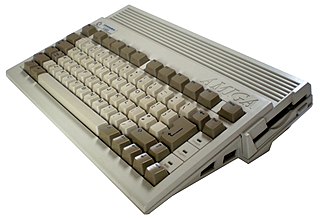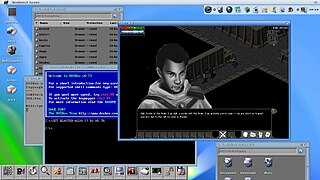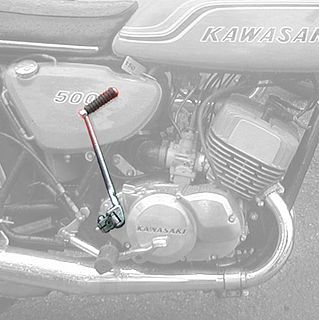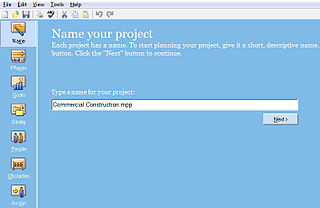
The Amiga is a family of personal computers introduced by Commodore in 1985. The original model was part of a wave of 16- and 32-bit computers that featured 256 KB or more of RAM, mouse-based GUIs, and significantly improved graphics and audio over 8-bit systems. This wave included the Atari ST—released the same year—Apple's Macintosh, and later the Apple IIGS. Based on the Motorola 68000 microprocessor, the Amiga differed from its contemporaries through the inclusion of custom hardware to accelerate graphics and sound, including sprites and a blitter, and a pre-emptive multitasking operating system called AmigaOS.
The Enhanced Chip Set (ECS) is the second generation of the Amiga computer's chipset, offering minor improvements over the original chipset (OCS) design. ECS was introduced in 1990 with the launch of the Amiga 3000. Amigas produced from 1990 onwards featured a mix of OCS and ECS chips, such as later versions of the Amiga 500 and the Commodore CDTV. Other ECS models were the Amiga 500+ in 1991 and lastly the Amiga 600 in 1992.

The Amiga 600, also known as the A600, is a home computer that was introduced at the CeBIT show in March 1992. The A600 is Commodore International's final model based on the Motorola 68000 CPU and the ECS chipset. It is essentially a redesign of the Amiga 500 Plus, with the option of an internal hard disk drive and a PCMCIA port. A notable aspect of the A600 is its small size. Lacking a numeric keypad, the A600 is only slightly larger than a standard PC keyboard. It shipped with AmigaOS 2.0, which was generally considered more user-friendly than earlier versions of the operating system.

The Commodore Amiga 3000, or A3000, is a personal computer released by Commodore in June 1990. It features improved processing speed, improved rendering of graphics, and a new revision of the operating system. It is the successor to the Amiga 2000.

UAE is a computer emulator which emulates the hardware of Commodore International's Amiga range of computers. Released under the GNU General Public License, UAE is free software.
TRIPOS is a computer operating system. Development started in 1976 at the Computer Laboratory of Cambridge University and it was headed by Dr. Martin Richards. The first version appeared in January 1978 and it originally ran on a PDP-11. Later it was ported to the Computer Automation LSI4 and the Data General Nova. Work on a Motorola 68000 version started in 1981 at the University of Bath. MetaComCo acquired the rights to the 68000 version and continued development until TRIPOS was chosen by Commodore Amiga in March 1985 to form part of an operating system for their new computer; it was also used at Cambridge as part of the Cambridge Distributed Computing System.

The Commodore Amiga 4000, or A4000, is the successor of the A2000 and A3000 computers. There are two models, the A4000/040 released in October 1992 with a Motorola 68040 CPU, and the A4000/030 released in April 1993 with a Motorola 68EC030.
The Amiga Fast File System is a file system used on the Amiga personal computer. The previous Amiga filesystem was never given a specific name and known originally simply as "DOS" or AmigaDOS. Upon the release of FFS, the original filesystem became known as Amiga Old File System (OFS). OFS, which was primarily designed for use with floppy disks, had been proving slow to keep up with hard drives of the era. FFS was designed as a full replacement for the original Amiga filesystem. FFS differs from its predecessor mainly in the removal of redundant information. Data blocks contain nothing but data, allowing the filesystem to manage the transfer of large chunks of data directly from the host adapter to the final destination.

Module files are a family of music file formats originating from the MOD file format on Amiga systems used in the late 1980s. Those who produce these files and listen to them, form the worldwide MOD scene, a part of the demoscene subculture.
These tables provide a comparison of operating systems, of computer devices, as listing general and technical information for a number of widely used and currently available PC or handheld operating systems. The article "Usage share of operating systems" provides a broader, and more general, comparison of operating systems that includes servers, mainframes and supercomputers.

Linux-VServer is a virtual private server implementation that was created by adding operating system-level virtualization capabilities to the Linux kernel. It is developed and distributed as open-source software.
Amiga emulation refers to the activity of emulating a Commodore Amiga computer system using another computer platform. Most commonly, a user will emulate the Amiga using modern platforms such as Wintel or Macintosh. This allows Amiga users to use their existing software, and in some cases hardware, on modern computers.
AmigaOS is the proprietary native operating system of the Amiga personal computer. Since its introduction with the launch of the Amiga 1000 in 1985, there have been four major versions and several minor revisions of the operating system.

Minimig is an open source re-implementation of an Amiga 500 using a field-programmable gate array (FPGA).

AROS Research Operating System is a free and open-source multi media centric implementation of the AmigaOS 3.1 APIs. Designed to be portable and flexible, ports are currently available for x86-based and PowerPC-based PCs in native and hosted flavors, with other architectures in development. AROS, in a show of full circle, was also ported to the m68k-based Amiga 1200, and there's also an ARM port for the Raspberry Pi series.
Cobbler is a Linux provisioning server that facilitates and automates the network-based system installation of multiple computer operating systems from a central point using services such as DHCP, TFTP, and DNS. It can be configured for PXE, reinstallations, and virtualized guests using Xen, KVM or VMware. Cobbler interacts with the koan program for re-installation and virtualization support. koan and Cobbler use libvirt to integrate with different virtualization software. Cobbler is able to manage complex network scenarios like bridging on a bonded Ethernet link.

AmigaOS is a family of proprietary native operating systems of the Amiga and AmigaOne personal computers. It was developed first by Commodore International and introduced with the launch of the first Amiga, the Amiga 1000, in 1985. Early versions of AmigaOS required the Motorola 68000 series of 16-bit and 32-bit microprocessors. Later versions were developed by Haage & Partner and then Hyperion Entertainment. A PowerPC microprocessor is required for the most recent release, AmigaOS 4.
The Amiga 1200, or A1200, is a personal computer in the Amiga computer family released by Commodore International, aimed at the home computer market. It was launched on October 21, 1992, at a base price of £399 in the United Kingdom and $599 in the United States.













